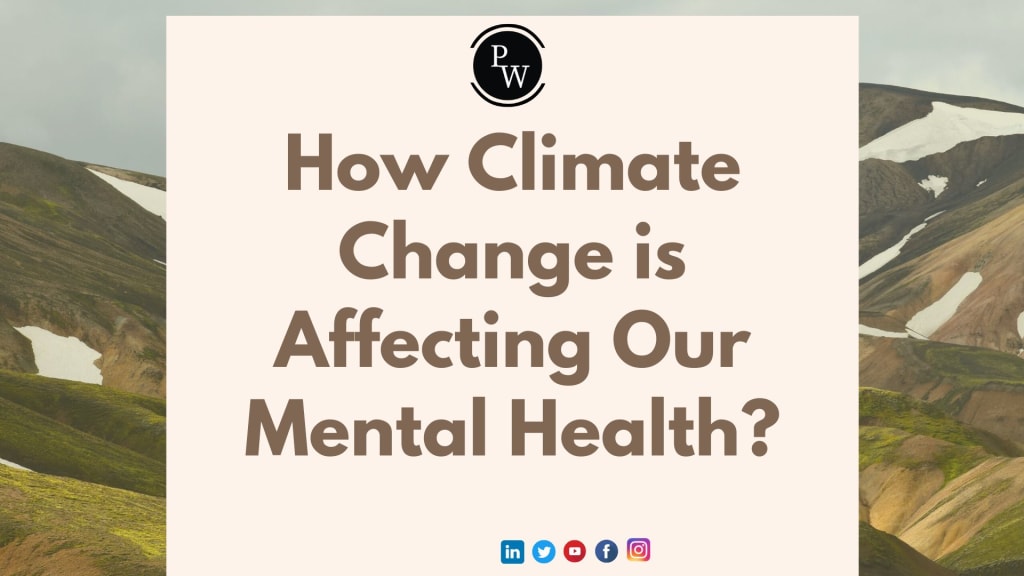How Climate Change is Affecting Our Mental Health? - Research-Backed
Climate Change is Affecting Our Mental Health?

Climate change has been an essential topic of discussion, especially in recent years, due to the seriousness of the problem. Anyone who understands the slightest bit of climate knows that our world isn't getting any better. Currently, we are seeing floods and drought in many parts of the world. Climate change is affecting our day-to-day life, from changing weather patterns to shortages of food and water.
Climate change is affecting our physical and mental health too. We see an increasing number of cancer cases. Some research has shown that the spread of the pandemic climate change roll can't be denied. In this article, we are going to talk about how climate change poses a risk to our mental health. NCERT is making children aware of the environment from early classes. NCERT has added a chapter on "Climate Change and its effects." You can check out NCERT Solutions to read this.
Climate change poses serious dangers to mental health and well-being, according to a new World Health Organization (WHO) guideline briefing presented at the Stockholm 50+ meeting on 3 June 2022.
How Climate Change is related to mental health?
Natural disasters have detrimental effects on health and mental health. Most people will do well in the end, but many affected by extreme weather and slow events like drought experience various difficulties. Risky coping behaviors include increased alcohol use and sometimes mental disorders such as depression, anxiety, and post-traumatic stress. To study how climate change affects our daily life, you can check our NCERT Solutions for Class 10 Geography.
The impacts of climate change can lead to job loss, forced displacement of people, and loss of social support and community resources, all of which affect mental health. Anticipating extreme weather events and anxiety about climate change can also be stressful. There are steps you can take to be better prepared for natural disasters and to help yourself and your family in the event of a natural disaster.
How Climate Change is Affecting Our Mental Health?
Climate change and related natural disasters cause anxiety-related responses and chronic and severe mental health disorders. Floods and prolonged droughts are associated with increased anxiety, depression, and post-traumatic stress disorder. Trauma and losses from natural disasters, such as losing a home or job, or losing contact with neighbors and communities, can cause depression and anxiety.
Extreme weather events have also been linked to increased violent behavior and domestic violence.3 Exposure to excessive heat can lead to higher alcohol consumption to cope with stress, hospitalizations, and emergency room visits for people with mental illness or mental health problems. May increase. Suicide increase.
The need for mental health services is increasing after climate-related disasters. At the same time, service disruptions or service availability or reduced availability often occur.
Interconnection and long-term effects of Climate Change:
According to a report published by United Nations High Commissioner for Refugees, every year since 2008, on average, almost 20 million people have been forced to move due to weather-related events such as floods, wildfires, storms, extreme temperatures, etc. Others leave their homes due to slow-moving events like drought and coastal erosion.
These long-term climate change effects and associated results such as population migration, food scarcity, loss of employment, and social support can have long-term impacts on mental health.
How to recover from a disastrous Climate Change effect?
Following a disastrous event, knowing what to do and how you can help your loved one recover from it can be helpful.
After a disastrous event, takes shelter in a safe place, eat when you feel hungry, sleep or take a rest when you are tired and drink enough water to stay hydrated.
Don't use alcohol and tobacco excessively; these can increase stress and affect your mental health.
Talk to your friends and family members who have gone same traumatic stress or can hear your problems, and sharing can help reduce your stress and give appropriate and helpful advice.
Listen. Listen to people's concerns and how they are coping with the situation and avoid making comments about how they should feel or "Everything happens for a reason," etc.
Frequently Asked Question (FAQs)
Q1. How does climate change affect our mental health?
Ans. The effect of climate change is broad. The evens related to climate change include stress problems, high-risk coping behavior such as increased alcohol consumption, and mental disorder such as anxiety, depression, and post-traumatic stress.
Q2. How does climate change cause stress?
Ans. Droughts, floods, rising sea levels, increasing atmospheric temperatures, and other climate change impacts can raise psychological distress via many factors. These factors include financial strain, migration and acculturation stress, social cut-off, food shortage, etc.
Q3. What are the main threats to climate change?
Ans. The main threats of climate change include the rising temperature of the earth's atmosphere, rising sea levels, changing patterns in weather, and ecosystem collapse. The greenhouse gases caused by humans affect the wide ecosystem in many ways.
About the Creator
Advika Singh
Advika Singh is a top-performing digital marketer for a company named Infinity Learn (IL) a student online education provider. As a digital marketer, it is my passion to work with amazing people, use cool tools, solve tricky problems.






Comments
There are no comments for this story
Be the first to respond and start the conversation.